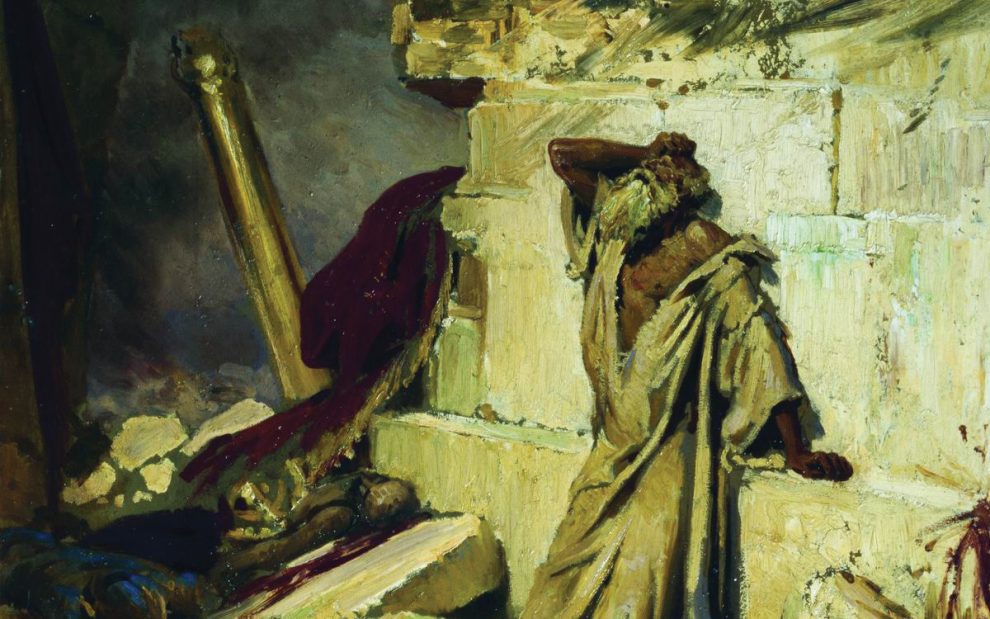“This man ought to be put to death because he is discouraging the soldiers . . . and all the people by speaking such words to them.” (Jeremiah 38:4)
My best friend, Erin, called me from Denver during that first scary summer of the pandemic. I lived in Rhode Island then and was alarmed when I saw her name on the caller ID, since Erin never used the phone, and the pandemic was a time when news was almost always bad.
Erin and I met when we both lived in the Bay Area and had exchanged emails every morning for years since we both moved away. Erin had cared for her older sister for more than a decade, and in recent years it had become impossible for her to be away from Denver for any length of time.
Zoom had just become a thing, though, and we marveled at it as a way to stay in touch. In the Zoom window during a recent call, I’d been stunned to see how much weight Erin had lost since our last visit. But her sister had recently died—weeks before anyone had heard of COVID-19—and when Erin began feeling poorly, she attributed the physical suffering to an embodiment of grief and loss.
But now Erin was calling from a hospital, saying she’d gone to the emergency room when the pain became too great to ignore. “I thought they’d give me a pill or something,” she told me. “But now I’m done. And I feel OK about that.”
Done. Just that word—but a host of meanings.
A very aggressive cancer had silently taken hold while Erin was looking the other way, dismissing her own symptoms, as caregivers often do. The ER doctor recommended immediate surgery. Not to seek a cure, as there was none; but merely to buy time, and only a fraction of that. Erin wouldn’t be leaving the hospital, nor would she be able to breathe on her own again. She responded to this shocking news bluntly: “No.”
She repeated to me what she’d told the doctor: “There’s only one way for this to work out—and I’m going to tell you what it is. No surgery. No machines. I’m dying.” The doctor objected, insisting she would die in weeks, maybe days, without intervention. Erin remained obstinate and was released to hospice care.
This phone conversation, though I didn’t know it then, would be our last. I was at my desk with paper in front of me, so I found myself scribbling notes as Erin spoke, trying to absorb what she was saying. I still have that piece of paper, on which I wrote down three words. They filled me with awe at the time and still do: Beautiful. Wonderful. Elegant. I drew a box around these words after Erin hung up. She had spoken them in a variety of contexts during that final conversation, and they were so unexpected and grand. I wanted to remember them. What could such words have to do with her urgent situation with terrible physical suffering that would certainly and soon lead to her end?
I’d been too stunned and saddened by my friend’s news to take full dictation. The precise context of those surprising words is now gone from memory. But a dying woman spoke them to me, and they have become, in a way, Erin’s epitaph.
Contemplating this month’s passage from Jeremiah Chapter 38—sinking into the mud of a cistern with light and freedom distressingly far above him and out of reach—these words resurface for me. Because, despite what we normally imagine, Jeremiah’s story is one of hope, not despair.
There’s nothing beautiful or wonderful about being abandoned in an empty well, of course. Facing death alone and helpless while the city you love is under siege above you is not an elegant form of demise. If Jeremiah was often an oracle of gloom whose words demoralized soldiers and the populace, well, he had reasons. But the thing is, Jeremiah was right. Jerusalem was going to be handed to its enemies for destruction. Denial wouldn’t erase the inevitable.
Telling the brutal truth and, moreover, accepting that truth, is a remarkable thing to do. It requires courage, a strength which encompasses all those rare elements: beauty, wonder, and elegance. If we knew how truth sparkles in the light—and even in the darkness of a cistern—perhaps we’d be less afraid of it. Instead, we often prefer the comfort of false consolations, the swift contentment of changing the channel on bad news. Yet the booby prize for not believing the prophet at the bottom of the cistern is being broken to pieces by the very same truth we resist.
My friend Erin wasn’t broken by the revelation that she was dying. Oddly, it exalted her. She’d never been a person celebrated for the ability to make snap decisions. Rather, Erin reveled in indecision, interminably turning over each fragment of a choice. Heck, Erin couldn’t buy a hat without walking away from it five times first. Yet when she understood her body was shutting down, she recognized the exit sign and took it. Beautiful, wonderful—and yes, elegant.
In this year dedicated to embracing a pilgrimage of hope, I perceive how both Erin and Jeremiah were pilgrims on that road. They recognized, though trapped at the bottom of a muddy cistern, how hope is possible. Erin died in peace three weeks after her diagnosis. Jeremiah was pulled from the cistern to prophecy through the complete ruin of his city, before being kidnapped by his countrymen and finally murdered while in exile in Egypt. Jeremiah’s later editors compiled and arranged his many warnings and predictions, 52 chapters in all, most of them harsh and forbidding.
And yet, if you read all 52 chapters, you discover the surprise nestled inside. In the midst of all too accurate predictions of destruction, desolation, and exile, Jeremiah’s editors inserted his prophecies of restoration. Not at the end, mind you; but in the middle, Chapters 30 through 33. Buried amid dire and immutable forecasts is the shimmering pearl of hope. It’s not unlike the prediction Jesus makes when his close friend Lazarus lies gravely ill: This illness will not end in death. Of course, Lazarus does die. And yet. His story doesn’t end there.
In Jeremiah’s time, Jerusalem is destroyed, the Temple razed, and most of the community dragged off in chains to Babylon. The worst that could happen does happen. But that’s not the end of the story: The prediction of restoration planted at the heart of the book is true.
Jeremiah proclaimed this restoration in the midst of his own anguish at the loss of all he holds dear. He believed in a restoration he would not live to see. He confessed hope in full view of a devastation that had no chance of being averted until it was undone, a generation into the future. This makes Jeremiah our brother, 26 centuries removed. We too face harsh and seemingly immutable perils in this generation. Most of us will also endure great personal challenges and losses.
Beautiful. Wonderful. Elegant. These words describe the hope of a woman who agonized over every decision of her life, big and small, until the last one. They conjure Jeremiah at the bottom of a well, half-swallowed by mud, lonely, deprived of the sun, meditating on a dream of restoration. And this is important, since few of us will escape a season of our own darkness, sentenced by mortality to loss, ill fortune, loneliness, limitation, and diminishment. Yet we can choose to believe in a rescue we cannot see, a healing whose source we cannot seem to touch. Because the only hope that matters is the kind that comes when you need it. Journey on, pilgrims.
This article also appears in the August 2025 issue of U.S. Catholic (Vol. 90, No. 8, pages 47-49). Click here to subscribe to the magazine.
Image: Wikimedia Commons
















Add comment